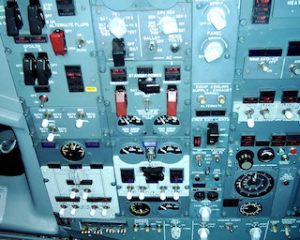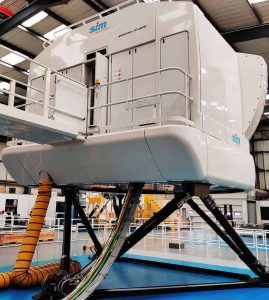Jet Orientation Course (JOC) Enhances Pilot Career Prospects
 In the dynamic and demanding world of aviation, the Jet Orientation Course (JOC) plays a pivotal role in preparing pilots for successful careers. As a prerequisite for airline employment and type rating training, the JOC equips pilots with essential skills and knowledge needed for operating jet aircraft. This comprehensive course enhances a pilot’s qualifications, boosts career prospects, and lays a strong foundation for further professional development. This article delves into the significance of the JOC, its benefits, and why completing this course is crucial for aspiring airline pilots.
In the dynamic and demanding world of aviation, the Jet Orientation Course (JOC) plays a pivotal role in preparing pilots for successful careers. As a prerequisite for airline employment and type rating training, the JOC equips pilots with essential skills and knowledge needed for operating jet aircraft. This comprehensive course enhances a pilot’s qualifications, boosts career prospects, and lays a strong foundation for further professional development. This article delves into the significance of the JOC, its benefits, and why completing this course is crucial for aspiring airline pilots.
Understanding Jet Orientation Course (JOC)
The Jet Orientation course is a specialised training program designed to bridge the gap between basic flight training and the advanced type rating training required for operating specific jet aircraft. It focuses on the unique challenges and complexities associated with flying jets, which differ significantly from those encountered in piston-engine or turboprop aircraft.
Core components of JOC
The JOC typically includes the following key components:
- Jet aerodynamics: Understanding the aerodynamic principles specific to jet aircraft, including high-speed aerodynamics, wing sweep effects, and compressibility factors.
- Jet performance: Learning about the performance characteristics of jet aircraft, such as thrust management, climb and descent profiles, and fuel efficiency.
- Flight control systems: Familiarising with advanced flight control systems, including fly-by-wire technology and hydraulic systems.
- Jet handling skills: Developing the skills required for manoeuvring jet aircraft, including takeoff and landing techniques, speed control, and emergency procedures.
- Crew resource management (CRM): Emphasising the importance of teamwork, communication, and decision-making in a multi-crew environment.
JOC is a Prerequisite for airline employment
The aviation industry places a high value on the JOC as a prerequisite for airline employment. Here’s why this course is crucial for aspiring airline pilots:
1) Bridging the transition to jet aircraft
The transition from flying smaller, piston-engine aircraft to larger, more complex jet aircraft is a significant leap. The JOC provides the necessary training to make this transition smoother and more manageable. By covering the fundamental differences in handling and performance, the JOC prepares pilots for the demands of jet operations.
2) Enhancing pilot competence and confidence
Jet aircraft operate at higher speeds, altitudes, and involve more sophisticated systems than propeller-driven aircraft. The JOC equips pilots with the skills and knowledge to handle these complexities confidently. This enhanced competence reduces the risk of errors and enhances overall flight safety.
3) Meeting industry standards and regulations
Regulatory authorities and airlines have stringent requirements for pilot training and qualifications. The JOC ensures that pilots meet these standards, making them eligible for further training and employment with commercial airlines. It serves as a benchmark of proficiency that airlines look for when hiring new pilots.
4) Providing a competitive edge in the job market
In a competitive job market, having completed the JOC gives pilots a distinct advantage. Airlines prefer candidates who have undergone this specialized training as it demonstrates their commitment to professional development and readiness for the challenges of jet operations. This competitive edge can be crucial in securing employment with reputable airlines.
Importance of JOC for Type Rating Training
Type rating training is mandatory for pilots to operate specific models of jet aircraft. The JOC serves as a preparatory course for this advanced training, offering several benefits:
1) Building a strong foundation
The JOC lays a strong foundation in jet aircraft operations, covering essential topics such as aerodynamics, performance, and flight control systems. This foundational knowledge is critical for the more specialized and detailed training that pilots receive during type rating.
2) Smoothing the learning curve
Type rating training can be intense and demanding. By completing the JOC beforehand, pilots can smooth the learning curve and grasp complex concepts more easily. This preparation helps them to better absorb the detailed systems and procedures specific to the aircraft they will be type rated on.
3) Enhancing practical skills
The practical skills developed during the JOC, such as jet handling and CRM, are directly applicable to type rating training. Pilots enter type rating courses with hands-on experience in jet simulators, making them better prepared for real-world operations.
4) Reducing training costs and time
Airlines invest significant resources in training their pilots. By completing the JOC, pilots are better prepared for type rating training, which can lead to reduced training costs and time for airlines. This efficiency is beneficial for both pilots and airlines, making the JOC a cost-effective step in the training process.
Benefits of completing the JOC
Beyond meeting prerequisites for employment and type rating, the JOC offers numerous benefits that enhance a pilot’s qualifications and career prospects:
1) Advanced technical knowledge
The JOC provides pilots with advanced technical knowledge of jet aircraft systems and operations. This knowledge is essential for troubleshooting and managing in-flight issues, contributing to safer and more efficient flight operations.
2) Improved decision-making skills
The JOC emphasizes decision-making in a high-stress, fast-paced environment. Pilots learn to assess situations quickly, consider multiple factors, and make informed decisions. These skills are critical for handling emergencies and ensuring passenger safety.
3) Enhanced crew coordination
Modern jet aircraft are typically operated by multi-crew teams. The JOC includes CRM training, which focuses on effective communication, teamwork, and coordination among crew members. Enhanced crew coordination leads to more efficient and safer flight operations.
4) Greater adaptability to advanced aircraft
The aviation industry is continuously evolving, with advancements in aircraft technology and systems. Pilots who have completed the JOC are better equipped to adapt to these changes, making them valuable assets to airlines that operate modern fleets.
5) Increased employment opportunities
Airlines prefer hiring pilots who have completed the JOC because it demonstrates their readiness for jet operations. This preference translates into increased employment opportunities and the potential for faster career progression.
Career prospects after completing the JOC
The career prospects for pilots who have completed the JOC are significantly enhanced. Here’s how this course impacts their career trajectory:
- Entry-level positions with reputable airlines: Completing the JOC opens the door to entry-level positions with reputable airlines. Airlines prioritize candidates with JOC certification, recognizing their preparedness for jet operations. This initial step is crucial for building a successful career in commercial aviation.
- Opportunities for type rating sponsorship: Many airlines offer sponsorship for type rating training to pilots who have completed the JOC. This sponsorship not only covers the cost of type rating but also provides pilots with a direct pathway to operating specific aircraft models, furthering their career progression.
- Potential for rapid career advancement: Pilots who have undergone JOC training demonstrate advanced skills and knowledge, making them candidates for rapid career advancement. They are better positioned for promotions to senior roles, such as captain or training instructor, within shorter timeframes.
- Global career opportunities: The JOC is recognised internationally, providing pilots with career opportunities across the globe. Airlines worldwide value the comprehensive training provided by the JOC, making it easier for pilots to secure positions with international carriers.
- Enhanced earning potential: With advanced training and increased qualifications, pilots who have completed the JOC often enjoy enhanced earning potential. Higher salaries, better benefits, and additional perks are common for pilots who possess the skills and knowledge gained through the JOC.
Conclusion
The Jet Orientation Course (JOC) is a critical component of pilot training, serving as a prerequisite for airline employment and type rating training. By providing a comprehensive understanding of jet aircraft operations, the JOC enhances a pilot’s qualifications, competence, and confidence. This specialized training not only prepares pilots for the complexities of jet operations but also gives them a competitive edge in the job market.
The benefits of completing the JOC extend beyond meeting industry standards and regulatory requirements. Pilots gain advanced technical knowledge, improved decision-making skills, enhanced crew coordination, and greater adaptability to advanced aircraft. These attributes contribute to safer and more efficient flight operations, making JOC-trained pilots valuable assets to airlines.
In terms of career prospects, the JOC opens doors to entry-level positions with reputable airlines, type rating sponsorship opportunities, rapid career advancement, global career prospects, and enhanced earning potential. For aspiring airline pilots, completing the JOC is a significant step towards a successful and fulfilling career in aviation.
As the aviation industry continues to evolve, the importance of the JOC will only grow. Pilots who invest in this training demonstrate their commitment to excellence and readiness for the challenges of modern aviation. The JOC is not just a prerequisite; it is a pathway to a brighter, more promising future in the skies.










